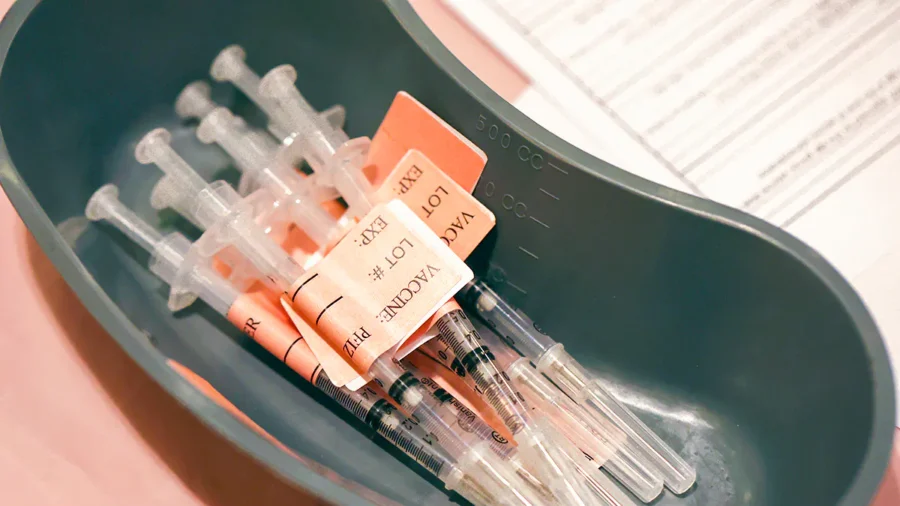U.S. Supreme Court justices on June 24 rejected appeals brought over COVID-19 vaccines by Children’s Health Defense (CHD), a nonprofit founded by Robert F. Kennedy Jr., an independent candidate running for president.
The nation’s top court rejected an appeal seeking to overturn lower court rulings that said CHD and its members lacked standing to sue the U.S. Food and Drug Administration (FDA) over its emergency authorizations of COVID-19 vaccines for minors.
The justices also rebuffed another CHD appeal in a case that challenged the COVID-19 vaccine mandate imposed on students at Rutgers University, a public college in New Jersey.
The Supreme Court did not comment on either denial. It included them in a lengthy list dealing with dozens of cases.
“Disappointing that the courts are closed to FDA fraud harming millions of Americans,” Robert Barnes, an attorney representing CHD in the FDA case, told The Epoch Times in an email. He called for Congress to pass reforms.
Julio Gomez, an attorney representing CHD in the Rutgers case, told The Epoch Times in an email that the Supreme Court’s denials marked a sad day because clarity is needed on vaccines and the Supreme Court’s 1905 decision in Jacobson v. Massachusetts, which upheld a city’s law requiring vaccination against smallpox.
Mr. Gomez pointed to a recent federal appeals court ruling that determined Jacobson did not apply to a case filed against a vaccine mandate in California because plaintiffs had produced evidence the COVID-19 vaccines do not prevent the spread of COVID-19.
Lawyers for Rutgers and the government did not return requests for comment.
In the FDA case, CHD and parents in Texas and Florida argued that the regulatory agency cleared COVID-19 vaccines under emergency authorization despite COVID-19 posing less risk than influenza to children, and without adequate clinical testing. The FDA also wrongly promoted the vaccines, the plaintiffs alleged.
U.S. District Judge Alan Albright, tossed out the lawsuit in 2023, finding that CHD and the parents did not meet the requirements for standing under Article III of the U.S. Constitution, or the ability to sue over the actions.
While the parents said their children were at risk of being vaccinated by other people, they did not show they faced imminent harm due to the FDA issuing emergency authorization for COVID-19 vaccines, the judge said. Imminent harm is one requirement for standing.
The judge also said that CHD had not shown its resources were drained in responding to the FDA’s conduct and that it was airing a “generalized grievance,” which is not allowed under Supreme Court precedent.
A panel of the U.S. Court of Appeals for the Fifth Circuit in January upheld the ruling.
“Plaintiffs contend that the injury-in-fact element is satisfied because a third party might vaccinate their children over their objections, and that such vaccine could allegedly injure them and their children,” the panel concluded. “Be that as it may, we agree with the district court that Plaintiffs fail to demonstrate an injury in fact because the alleged injury is neither concrete nor imminent.”
Mr. Barnes had urged the Supreme Court to look at the case. “Can no one sue the FDA? Is that what Article III means?” he wrote in a filing
Government lawyers waived their right to file a brief to the court.
In the case against Rutgers, CHD and some of its members said the vaccine mandate was unconstitutional in part because the Constitution’s Due Process Clause enables people to refuse medical treatment.
U.S. District Judge Zahid Quraishi ruled against the plaintiffs in 2022, finding that Rutgers mandated vaccination as part of a legitimate goal of protecting the school community from COVID-19 and that the students either brought claims that had become moot because they were granted religious exemptions to the mandate, or failed to state a claim.
A panel of the U.S. Court of Appeals for the Third Circuit in February upheld the decision.
In a filing to the Supreme Court, lawyers for CHD said the lower courts erred and that justices should intervene.
“If government is allowed to mandate experimental vaccines that do not prevent transmission against a person’s right to freely exercise informed consent, then COVID-19 will have eroded one of our most basic liberties—the right to refuse a medical experiment,” they said.
Rutgers declined to file a brief with the court.
From The Epoch Times

